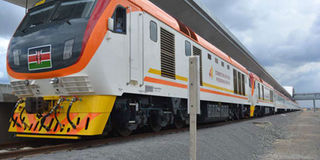Using propaganda to win votes will get Kenya nowhere

A passenger train on the standard gauge railway in Syokimau on May 29, 2017. PHOTO | JEFF ANGOTE | NATION MEDIA GROUP
What you need to know:
Using propaganda to win sympathy votes without any strategy on how to solve the problems facing the country is neither statesmanship nor leadership.
Telling lies about what you will do 90 days after elections is making the lie bigger.
Fortunately, Kenyans know the truth.
When voting results start trickling out after August 8, the truth will also trickle out, to the surprise of doomsayers.
One strategy that political cheer leaders employ is to selectively use facts to push their case. They look at a project like the Standard Gauge Railway (SGR) and decide who stands to benefit and who is going to lose depending on who they are talking to. It is an idea borrowed from Frederick Lugard: divide and rule. In Mombasa, for instance, one can say how the SGR will take away business from bus and truck owners. Elsewhere one can say he supports the SGR and that he even originated with the idea.
Overgeneralisation is the other strategy. Comparing Kenya with other countries, whose experiences are as different as day is from night. Comparing Kenya’s SGR with the Ethiopian and Tanzanian railway projects is very dishonest. Their terrain is different. So is their land tenure system. Their constitutions are different, so are their needs. Therefore, the design specs are different. The only similarity between Kenya and Ethiopia is that Ethiopia’s new trains have the same speed as ours at 120km per hour.
The third strategy is to appeal to emotions instead of logic. This excites the masses. This strategy is built on the belief that one is guilty until proven innocent. Because of this, top-ranking Kenyans have lost their jobs without having their day in court. Mob justice is real.
PURPORTEDLY STOLEN
Focus on the money purportedly stolen from the SGR project, not the benefits of the train service, excites the masses. Build a narrative with deep roots in stereotypes that certain people are corrupt. Ensure there is no time to celebrate a new rail after 117 years. We hate others succeeding and prefer them to fail so that we have something to talk about. If someone looks bad, then you are good, so goes the reasoning.
The fourth strategy is telling lies over and over again until they appear as truth. Connect one lie to another and instead of getting a bigger lie you think you will get a bigger truth. This is an easy way to incite the masses against the political establishment. The last strategy is to use social media to spread fears and rumours.
Let us look at a few examples facts have been distorted.
BEFORE TIME
The Jubilee Party surprised some by completing the SGR project before time. Many wanted it incomplete to portray failure. Yet, when passengers board the train no one asks them for their political affiliation. Can henchmen hire an independent railway engineer to get exact cost of the railway? When it was under construction, Thika Road was dismissed as a ghost project. I use it on my way to Nyeri and I know it now needs expansion! On cost escalation, any engineer will tell you that even with feasibility studies, costs rarely remain constant.
On another front, the maize shortage has been used to distort facts. Everyone knows rains failed and there was a shortage of maize. Every economist knows shortages lead to high prices. However, critics prefer to blame the government.
The truth on the cost of living has also been distorted. Drought led to shortage of food and a subsequent increase in prices. But critics are selective. They do not say the price of oil has been low and that this has checked prices. Shouting at rallies that the cost of living has gone up is music to the masses. It is much easier to blame the government than the weather, land subdivision and population increase.
ECONOMIC STAGNATION
By distorting facts, such critics are putting the country at risk. When masses are fired up to blame leaders, instead solving the problems facing the country, we face the real risk of economic stagnation.
Using propaganda to win sympathy votes without any strategy on how to solve the problems facing the country is neither statesmanship nor leadership. Telling lies on what you will do 90 days after elections is making the lie bigger. Fortunately, Kenyans know the truth. When voting results start trickling out after August 8, the truth will also trickle out, to the surprise of doomsayers.
Dr Wahome Gakuru, a former director of the Vision 2030 Delivery Secretariat, is a Jubilee Party candidate for the Nyeri gubernatorial seat.




